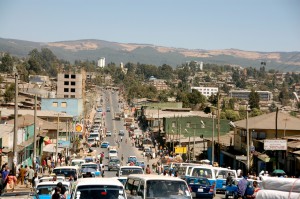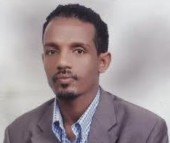Ethiopia on the Edge
by Chalachew Tadesse / February 2, 2016 / No comments

A main street in Addis Ababa, the Ethiopian capital. Image via: Wikimedia Commons.
Amidst a cloud of fear in Ethiopia, the government’s persecution of dissidents may indicate that civil war and ethnic cleansing is looming.
In the war-torn East Africa region that has been known for a specter of violence for decades, two poor nations, Burundi and Ethiopia, are today passing through a particularly intense bout of deaths and attacks. Since Burundi’s incumbent Pierre Nukuriziza insisted on running for a third term against the Constitution, the country has been on the verge of crisis. Fears are growing that ethnic cleansing and even genocide is looming.

- This column’s topics will include literature, art, education, history, and political culture in Ethiopia, as well as society and politics in the Horn of Africa. Moreover, I will address the tribulations of journalists and the ill-fated constitutional right of freedom of expression under Ethiopia’s deceptive authoritarian regime. I will try to be the voice of the voiceless, be it persecuted journalists at home or exiled journalists abroad. These themes will make Ethiopia’s uniqueness and absurdities evident.

- Chalachew Tadesse is an Ethiopian journalist and columnist. He has previously worked as a full time journalist for The Reporter and The Sub-Saharan Informer English newspapers. He was also a columnist for the much-acclaimed Fact magazine, before the Ethiopian regime closed it in October 2014. A political science student by training, he works as a university lecturer and is known for his sociopolitical commentaries on the Ethiopian private press.
Ethiopia’s situation is, however, a bit complicated. Being an ethnically-divided federal nation, ethnicity is a delicate and combustible matter to which the regime adds fuel. Since the 2005 election, draconian laws that stifle dissent and freedom of expression have been in place, and the government’s handling of dissent has worsened. Heavy handed responses to peaceful dissent became evident when University students in Oromia region snubbed the proposed Addis Ababa (the capital city) Master Plan which, they feared, would unduly evict ethnic Oromo farmers from their ancestral homes.
Faced with unending protests, the government was forced to put the plan in the cold after more than two months of bloodshed. According to Human Rights Watch, Amnesty and the European Union accounts security forces killed 140 civilians. But neither the use of lethal force nor the protest show any sign of ceasing. Sooner or later calm may be temporarily restored. Nonetheless, the hardest thing will be how and when to bring justice to the dead. Ethiopia’s authorities have a bad record in this regard.
Since the onset of the uprising, social media, the sole surviving fortress of dissent, is fraught with gruesome pictures of dead and injured civilians. The all-controlling government does not explain why nor how these cold-blood murders are taking place in many places including public University campuses. Before extra-judicial killings were rare occurrences, albeit widespread repression. Now, the government, which is grinding its jaw with anger, is allegedly killing its own people: it is widely believed that government forces are to blame for the widespread killings for which no one has taken responsibility. Despicable acts of extra-judicial killings are reported almost on daily basis.
There is a cloud of fear that the violence may sooner or later take ethnic dimension, in the way that it has in Burundi. The proposed Master Plan is just the tip of the iceberg. Beneath it there are deep-rooted frustrations, repression and alienation. The ongoing violence came six months after the ruling Ethiopian Peoples’ Revolutionary Democratic Front (EPRDF) claimed to have won almost 100 percent of votes in the May 2015 elections, a clearly outlandish lie. With these frustrating developments, the West’s cautious optimism about the government’s behavior has been washed away. Heavy-handed responses to peaceful protests reveal the regime’s resolve to do whatever it takes to maintain its grip on power.
The government, which is flatteringly labeled as the West’s poster child for democracy in Africa, has tried to get away with it. It is unrepentant for the loss of human life, save the willingness to undertake independent investigations about the proportionality of the use of force. Fictitious blame and massive imprisonment are still the only games in town. Strongly worded, dismissive, and inflammatory statements by the regime’s mouthpieces including the state media also add fuel to the fire by labeling protesters as “terrorist thugs.”
Since the onset of the protest, thousands have been locked up in inaccessible detention centers. Just five months after being released from prison, Bekele Gerba, a prominent opposition politician was apprehended again and thrown into a notorious prison during protests last month. Repeated requests by opposition parties for peaceful demonstrations or public rallies against the killings have been rebuffed. Even state media journalists who are suspected of being sympathetic to the protesters have not been spared. Journalist Abebe Negasa of the Oromiffa (the language of the ethnic Oromos) section of the State Television and Getachew Shiferaw of Negere Ethiopia newspaper (organ of an opposition party) were detained for unexplained, dubious charges. In the midst of the protest, the appeal of the Prosecutor to reinstate the charges against the Zone-9 bloggers has been accepted.
Massive security presence across the Oromia region (the country’s largest region) and even entire lockdown in several towns has in effect turned the country into a police state. In every protest and expression of dissent the authorities always use the broadly-phrased laws that are being used to permeate the regime’s control of society. The hegemonic ruling party has, at least in its own admission, over seven million registered political cadres in the entire country. Worse still is its virtual control over the rest of the majority of the population with the help of the infamous “one-to-five” cells, which the ruling party created within the society. These surveillance networks are meant to spy on citizens or gather information that appears to be threatening to the regime’s power. So, it is not only the official anti-terrorism laws per se that sanction prohibition against freedom of expression. The party’s informal spying networks also do. Under these horrifying circumstances one can easily contrast the hidden transcript of the oppressed to the official explicit transcripts.
Using these North Korean-style surveillance networks, the authorities do not even miss bedtime family gossips. In effect, nothing is out of its sight, and beyond its reach. So, to say that the “perpetrators” of the well-orchestrated killings are “anti-peace forces”— which are always nameless and faceless–defies common sense to say the least. The authorities can’t name or expose the identity of the so-called “anti-peace forces” who allegedly orchestrate the violence, yet supposedly they hear, see, and know all. That is why human rights activists justifiably contend that the government is the real culprit for all the recent civilian deaths, with the intent of hijacking the legitimate peaceful protests. Nevertheless, since Ethiopia is diverse, it will be quite difficult for the regime that is largely based on one ethnic group, i.e. the Tigrayans to effectively control mass protests of such kind for long-–whether they are spontaneous or organized.
Recently, the European Parliament issued an unusual strong resolution against the government’s use of force on peaceful protesters and its continuing attempt to stifle dissent in general. The resolution has called for the release of all political prisoners and journalists unconditionally and allows independent investigations to the killings. The European Parliament’s resolution has evidently been influenced by dissident human rights activists and dissident Ethiopian media in the Diaspora- including the Ethiopian Satellite Television, the Oromo Media Network Television and Wazema Radio– based in the United States. The Obama Administration has also criticized the government’s handling of the situation expressing grave concern on the worsening of the situation of freedom of expression.
In the midst of this, the government orchestrated the establishment of the first ever so-called “independent” Media Council in January in a bid to distract attention. However, the Media Council excludes the independent journalist association and more than half of the independent publications. What is more, the Council’s creation was spearheaded by some government media owners rather than practicing independent journalists and members of civil society groups. Hence, the new Media Council will not be a panacea for the persecution of the independent press what so ever.
Giving the regime the benefit of the doubt any longer will only breed more violence. That is what its Western partners must learn before it is too late. The clarion call of Ethiopians–at home and the Diaspora–for Western countries to put more pressure on this repressive and deceptive government should no longer fall on deaf ears. Otherwise, the regime is pushing the second most populous nation in Africa to the edge and it is likely that it will explode to full-scale political crisis and possibly civil war. As the saying goes, making peaceful change impossible will make violent change inevitable.




